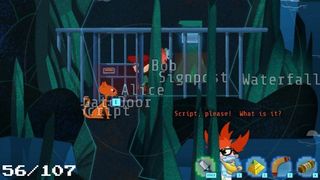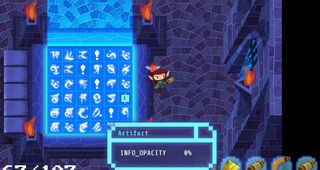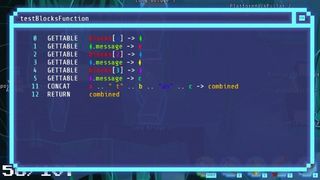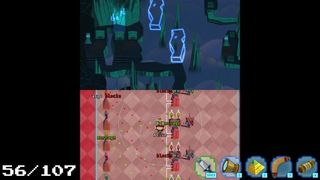Our Verdict
Hack 'n' Slash starts as a clever game about game design, but ends up feeling like homework.
PC Gamer's got your back
Price: $20/£15
Release date: Out now
Publisher/Developer: Double Fine Productions
Multiplayer: Nope
Link: Official site
Hack 'n' Slash is a game by programmers about programming, and if you're not interested or experienced with the subject it will eventually leave you behind. It looks and controls like Zelda, but unfolds more like a point-and-click adventure game, asking you to use a variety of items to solve puzzles. The twist is that you're able to hack various objects in the game and manipulate them in order to find a solution.
It starts with a simple door. Rather than pick the lock or find a key, I only needed to hit it with my USB sword and switch it to the 'open' state. Things ramp up quickly though, and soon I'm hacking a nest of turtle eggs, fiddling with their spawning speeds and reconfiguring their behavior routines to defeat a boss. Rather than attacking me, I reprogrammed them to turn, run right into the the giant evil turtle, and explode on impact.
Hack 'n' Slash's first half is a well-paced series of surprising discoveries. One of my pet peeves about games is traveling through big, uninteresting environments with a character that moves slowly. There were a few of these areas in Hack 'n' Slash, but just as they were testing my patience, I figured out that I could toss my boomerang, turn around, and hit myself in the back of the head to hack my character. One of the values I could change was movement speed, which I immediately cranked up to a value of 700. I zoomed through the rest of the game like a bullet.

I wasn't actually reprogramming my character or the turtles, but Hack 'n' Slash made me think about how they work, technically, and how I could tinker with them to get ahead.
Around the midpoint, however, Hack 'n' Slash becomes something that feels much more like actual scripting. It's a jarring, steep increase in difficulty that I never quite got used to, and after a certain point, didn't care to.
I was introduced to a new item that allowed me to jump into scripts, and change simple "if-then" statements to move bridges into place or change enemies' behavior in greater detail. I tried to keep up with the new material, but the scripts get longer, more complex, and near infinite, allowing me to dig deeper into components within components of a sequence, Inception-like, and modify them further. At that point, Hack 'n' Slash feels less like a game and more like text-only coding environment.
I love games, but I don't really care about ports, understanding what an "arg" is, and generally how algorithms work. It's on Hack 'n' Slash to convince me that I should care about this stuff and make learning about it entertaining. It does neither.

Critical errors
I'm no longer trying to figure out how to move platforms to get my character across a chasm so he can reach the castle and defeat the evil wizard. I'm trying to figure out what a "GETTABLE" is, and if moving it through a purple switch will move the platform where I want it to be or break the game. Usually it's the latter, and while Hack 'n' Slash is good about resetting to the nearest room after the inevitable crash, it's still a chore to start over, especially if the puzzle is preceded by a dialogue you have to skip through every time.
I ended up doing what I did in algebra class, which is learn the least I could to get by just so I could move on with my life to more interesting things. I started changing values randomly and solving puzzles by accident, which is even worse than being stuck. I progressed without learning what the game was trying to teach me. It relies on my retaining the lesson going into the next puzzle, but I didn't, so it's even more impenetrable. The fact that one of the puzzles pivots on the self-aggrandizing programing motto "hack the planet" is indicative of how self-referential and insular Hack 'n' Slash can be.

It doesn't look good either. The visual nods to Zelda are cute, and help ground its high concept, but are executed poorly. Everything in Hack 'n' Slash's environment has a muddy, grainy texture, and highlights the pixels on every edge. Worse yet, the designs themselves are bad, with bland backgrounds and characters that look like Microsoft Word clip art.
I was also disappointed that Hack 'n' Slash didn't develop a real story. I usually don't care about that stuff, but there is so little keeping its world together, it feels unfinished. I often didn't know where I was headed next or why.
The first half of Hack 'n' Slash proves that it has an idea worth exploring. For as long as I could keep up with it, I enjoyed hacking a guard into thinking I wasn't a threat rather than fighting him like I do in every other game, or disabling a pipe spewing fireballs rather than dodging them. I love the notion of a game that looks like it's challenging me to jump around and fight like Link, but allows me to overcome every obstacle without breaking a sweat, just by using my wits and under-the-hood access.

It can be hilarious too. At some point, I got a tool that allowed me to slow down time. It's not some super empowering ability. I wasn't dodging enemies like Neo. It slows down everything, including menus, so I had to wait quite a bit for them to reopen so I could switch back to normal speed. It's funny the first time, and annoying every time after that.
That's Hack 'n' Slash. It starts with good intentions, but eventually becomes an inside joke between programmers. I'm sure it's funny if you get it, but I wasn't laughing.
Hack 'n' Slash starts as a clever game about game design, but ends up feeling like homework.

